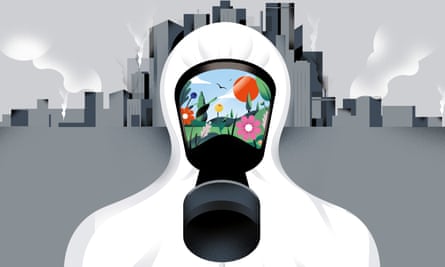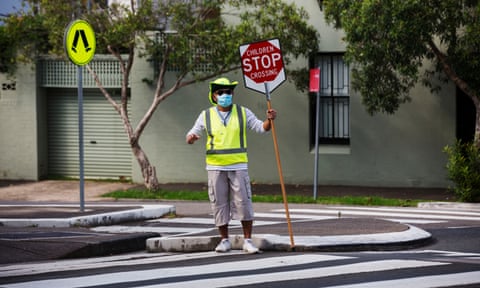Good morning, this is James Murray bringing you the main stories and must-reads on Wednesday 1 April.
Coronavirus
Strict new “stay at home” measures are now in place across Australia, and they vary in each state and territory. People who leave their home for reasons not on the exception list could face fines of up to $11,000 in NSW and $1,600 in Victoria. The new powers have raised civil liberties concerns among human rights advocates, who say people must be given additional latitude to comply with the fast-changing rules. And Guardian Australia has revealed that 10% of the country’s coronavirus cases are from the Ruby Princess cruise ship. As of Monday, at least 440 passengers across six states and two territories had tested positive for Covid-19 after disembarking from the cruise ship, which docked twice in Sydney in March. There are now more than 4,500 cases of Covid-19 in Australia.
More than 285,000 Australian businesses and sole traders have already applied for the government’s new jobkeeper payments, and industries continue to push for more assistance. The retail industry has asked for more casuals to be included in jobkeeper payments and Australian airlines have demanded as much as $5.6bn to keep them afloat through the pandemic. The government announced yesterday that it would support the ravaged seafood export trade with $110m to create a new freight assistance mechanism. Private hospitals, who were worried they would be subsumed by coronavirus demands without being able to make money from elective surgeries, are also being assisted, with half of the cost of them being integrated into the Covid-19 response being met by the government.
The global death toll from coronavirus now exceeds 40,000, with most coming from Italy and then Spain. The US is in third place, overtaking China with 3,415 deaths – but there are doubts about the accuracy of both countries’ figures. The US was slow to start widespread testing and it’s suspected China has hidden the true extent of its outbreak. Similar data reporting concerns have been registered in the UK, where 1,789 people have now died. A record 381 people, including an otherwise healthy 19-year-old, died yesterday in NHS hospitals. New statistics suggest the UK has underreported the number of coronavirus deaths by almost 24%.
New York state governor Andrew Cuomo says the bidding war for ventilators in America is like “being on eBay”. Meanwhile, Detroit is bracing for a surge of coronavirus cases as experts say poverty rates and the prevalence of chronic disease make residents vulnerable. The city appears to be showing a steeper curve for infections than New York. A car park turned homeless shelter in Las Vegas has sparked criticism among locals. Photos of the temporary shelter showing people sleeping close to each other on the ground, some within arm’s reach, sparked backlash on social media. And Chris McGreal looks at the difficulties of trying to combat Covid-19 with a profit-based health system. He reports from the Kansas city of Wellington where the only local hospital just shut its doors because it was losing money.
Australia
Mass bleaching seen along the Great Barrier Reef could mark the start of a global-scale event, according to the head of a US government agency program that monitors the globe’s coral reefs. Rising ocean temperatures could have pushed the world’s tropical coral reefs over a tipping point where they are hit by bleaching on a near-annual basis, Dr Mark Eakin, coordinator of Coral Reef Watch at the National Oceanic and Atmospheric Administration, told Guardian Australia.
Australians in their 20s have more cases of Covid-19 than any other age group. Some 11.3% of Covid-19 cases are among people aged 25 to 29, followed by 9.5% in those aged 60 to 65: the cruise ship cohort.
A Queensland government health panel has recommended the legalisation of euthanasia. A year-long investigation to gauge public opinion on voluntary euthanasia has determined that most Queenslanders are in favour of it.
Nearly one in five of Australia’s big polluting industrial sites increased emissions above government-set limits last financial year. Combined, they emitted about 790,000 tonnes of carbon dioxide over the limit.
The world

The US says it will lift sanctions on Venezuela if president Nicolás Maduro and his opponent Juan Guaidó step aside and pass power to an interim government made up of their supporters. Sceptics of the plan said it provided few incentives for the incumbent officials to give up power.
China is reporting mixed results in its attempts to lift lockdown measures put in place to stem the tide of Covid-19. Fugong fuchan (“resuming work, resuming production”), the government mantra of the past few weeks, has proceeded in fits and starts.
A crowd-sourced art project has captured the sounds of the world’s deserted cities. Highlights include an anti-coronavirus song from Senegal, applause for health workers ringing out in Paris and the return of the dawn chorus in Warsaw.
Recommended reads

Peter C Baker asks the question on everyone’s lips: how will coronavirus change the world? For some the pandemic presents an opportunity for a better, more secure, equitable world, while others fear the shock will just make existing injustices worse. “Everything feels new, unbelievable, overwhelming. At the same time, it feels as if we’ve walked into an old recurring dream,” writes Baker, before going on to explore a world transformed by the virus.
One thing that has already changed, albeit temporarily, is the way we conduct public rituals such as weddings, birthdays and funerals. With so many governments placing tight restrictions on the number of people who can gather in one place, people are having to find new ways to mark these moments in life. Eleanor Gordon-Smith reports on some of the more innovative examples, including the story of a man who met his grandson for the first time as he was held up to a glass window in a hospital.
Labor’s treasury spokesperson Jim Chalmers writes about what Australia will be like post-virus. He describes the pandemic as a failure of neoliberalism, and contemplates what system will come to dominate the world next.
Listen
The latest Full Story podcast investigates the new restrictions on daily life in Australia and asks: when is it legal to leave your home? Political reporter Paul Karp breaks down how states and territories are cracking down on people not taking the shutdown seriously.
When is it legal to leave your home?
Full Story is Guardian Australia’s news podcast. Subscribe for free on Apple Podcasts, Spotify or any other podcasting app.
Sport
Might the AFL shutdown offer a chance for the sport to build a more agile and inclusive game? “This game has long operated as an exclusive club that has left many out in order to protect those within,” writes Rana Hussain.
Premier League goalkeeper Pepe Reina talks about his terrifying ordeal with coronavirus. “The most difficult moment was when I could no longer breathe, the 25 minutes I ran out of oxygen. It was the worst moments of my life.”
Media roundup
Australia’s top 10 news websites saw huge increases in traffic in March, with audiences up by 54% on the previous four weeks. But a loss of advertising revenue as consumer spending contracts has seen job cuts across the industry.
The Age and the Sydney Morning Herald have an exclusive story about the government’s promised tax cuts being threatened by the pandemic. Scott Morrison has committed billions of dollars to the Covid-19 response and now faces a “fiscal reckoning”. ABC News reports on a study that highlights where coronavirus could cause the most harm if it spreads. It shows risk factors are high in regional and coastal areas, and lower in cities. And the West Australian reports Western Australia recorded just nine new cases of the virus in its best day since the crisis started.
Coming up
Real estate analytics firm CoreLogic will release figures on house prices for March.
The RBA is set to release minutes from its 18 March extraordinary board meeting where interest rates were cut to a record low 0.25%.
Sign up
If you would like to receive the Guardian Australia morning mail to your email inbox every weekday, sign up here.
